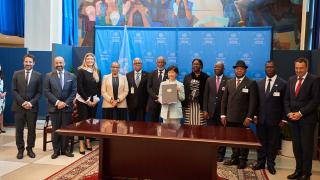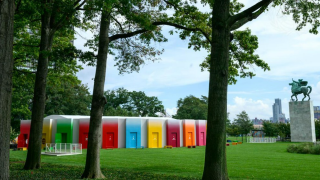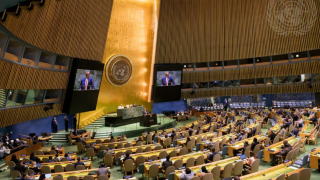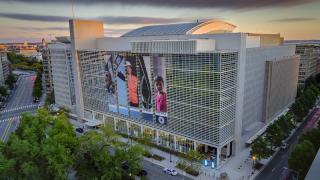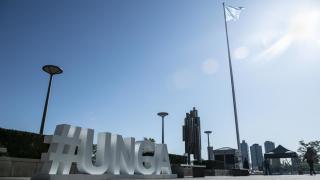The 80th session of the United Nations General Assembly begins this September. This is marked by High-Level Week from 22-30 of September (UNGA 80) at UN Headquarters in New York, an annual highlight in the diplomatic calendar.
UNGA 80, under the theme ‘Better together: 80 years and more for peace, development and human rights,’ comes at a pivotal moment as the UN faces a liquidity crisis and increased attacks on its humanitarian work, amidst wider attacks on international law and human rights globally. Despite these challenges, the unique forum that the General Assembly provides remains crucial. As one of the largest meetings of world leaders annually, UNGA week provides important opportunities for negotiations and discussions between global leaders.
There’s a lot to keep track of, we’ve put together this briefing to provide some key background information on the General Assembly, as well as links to timetables and key meetings at UNGA.
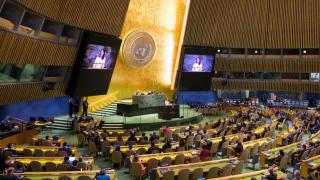
What is the General Assembly?
The UN General Assembly is the main legislative body of the United Nations. It is the only UN forum in which all 193 member states receive equal representation, and as such it is the main debating chamber of the UN.
The General Assembly is responsible for the UN’s budget, its membership, and appointing important roles within the UN, such as the non-permanent members of the UN Security Council. Unlike Security Council resolutions, General Assembly resolutions are non-binding on states. However, as well as putting the thoughts of the world on record, they can be great motivators for action, particularly within the UN system: commissioning reports, finding funds and establishing offices and processes.
When does it meet?
The UN General Assembly meetings are divided into annual sessions which start every year in September. The latest session, the 80th, began on Tuesday 9 September 2025. This opening includes a moment of silent reflection, and an address from the Secretary-General and the new President of the General Assembly, who this year is Annalena Baerbock of Germany. The session then runs for almost a year.
What is UNGA?
The term UNGA, while used to refer to the General Assembly as a whole, is also synonymous with the Assembly’s annual General Debate and High-Level Week of meetings that takes place every September, usually during the 2nd and 3rd weeks of the General Assembly Session.
World leaders gather at the UN to make speeches during the General Debate. Apart from high-level meetings, this is the only debate that Heads of State and Government regularly participate in. Permanent representatives participate in the other debates of the session across the year. This year’s General Debate starts on Tuesday 23 September; learn more about the General Debate here.
As well as the General Debate, UNGA includes a series of High-Level meetings on key topics, which this year include financing development, a two-state solution in Israel-Palestine, the prevention of Noncommunicable Diseases, and the Rohingya refugee crisis.
UNGA week tends to attract a lot of media attention due to the high-profile speakers, but the real work of the General Assembly takes place throughout the rest of the year.
What are the key events of UNGA 80?
-
22 September: the High-Level Meeting to Commemorate the 80th Anniversary of the United Nations will reflect on the achievements of the past eight decades and the path ahead for a more inclusive and responsive multilateral system; the SDG Moment is held every year to highlight inspiring action on the Sustainable Development Goals; the High-level International Conference for the Peaceful Settlement of the Question of Palestine and the Implementation of the Two-State Solution will be a resumption of the High-Level conference that took place in July; the High-Level Meeting on the 30th Anniversary of the Fourth World Conference on Women will reflect on progress since the landmark 1995 conference in Beijing and highlight best practices and ongoing challenges in advancing gender equality worldwide.
-
23-27 and 29 September: the General Debate is the annual meeting where world leaders make statements outlining their positions and priorities in the context of complex global challenges.
-
24 September: the Climate Summit will be an opportunity for world leaders to present their new national climate action plans ahead of COP30 in Brazil; the First Biennial Summit for a Sustainable, Inclusive and Resilient Global Economy: Implementing commitments on financing development was mandated by last year’s Pact for the Future as a platform to unite multilateral efforts and the international financial system around shared goals for sustainable development
-
25 September: the High-level Meeting on the Prevention and Control of Noncommunicable Diseases and the Promotion of Mental Health and Well-being will set a Political Declaration to inform the core framework for accelerating global NCD prevention and control from 2025 onwards; the High-level Meeting to Commemorate the 30th Anniversary of the World Programme of Action for Youth will focus on strengthening intergenerational partnerships and promote greater youth participation in policymaking; the High-level Meeting to Launch the Global Dialogue on AI Governance will explore key dimensions of inclusive and accountable AI governance.
-
26 September: the High-level Meeting to Commemorate and Promote the International Day for the Total Elimination of Nuclear Weapons will be an opportunity for member states to reaffirm their commitment to global nuclear disarmament as a priority
-
30 September: the High-level Conference on the Situation of Rohingya Muslims and Other Minorities in Myanmar aims to sustain international attention, review the situation on the ground, and propose a concrete, time-bound plan for a sustainable resolution.
You can find a comprehensive list of all the meetings taking place here.
What is the General Debate timetable?
The order of speakers and latest updates from the General Debate, starting 23 September, can be found here. By tradition Brazil goes first (Brazil’s delegates were very effective in the very first few General Assembly sessions in getting to the podium first, and the tradition stuck!). As host, the US goes second. After that, speaker order is by negotiation, but Heads of State (Presidents and Kings) tend to go first, followed by heads of government (Prime Ministers) followed by Foreign Ministers, followed by other diplomats. Last year, only 19 of the 194 speakers at the General Debate were women.
This year the first five speakers of on the opening day of the debate are: Brazil, the United States, Indonesia, Türkiye and Peru. Prime Minister Keir Starmer is expected to make his speech on behalf of the UK on Friday 26 September. Notably, there will be no Palestinian Delegation at the General Debate due to the US refusing to grant their visas. Though as an observer state they do not have had voting rights, representatives from Palestine can speak at the General Assembly.
What are the Committees?
At the start of the session the General Assembly will form a General Committee consisting of the President, Vice Presidents, and committee chairs. They come up with a draft programme of work, which is then voted on by the General Assembly. This programme divides up the tasks of the General Assembly between its main body and its six committees:
-
The First Committee: Disarmament and International Security (DISEC)
-
The Second Committee: Economic and Financial (ECOFIN)
-
The Third Committee: Social, Cultural, and Humanitarian (SOCHUM)
-
The Fourth Committee: Special Political and Decolonisation (SPECPOL)
-
The Fifth Committee: Administrative and Budgetary and General
-
The Sixth Committee: Legal
Each UN member can have a representative on each Committee. These Committees, led by their chairs, work up proposals which they present to the General Assembly for a vote. The President of the General Assembly, in consultation with the General Committee, is responsible for managing the workload of the whole.
On most issues, both within a committee and within the main or “plenary” session of the General Assembly, a simple majority vote of those in attendance is required, but some more substantive or important issues, such as admitting a state to UN membership, require a two-thirds majority. To follow the up-to-date schedule of daily meetings, check out the UN Journal, which is updated every morning. The UN delegates handbook gives an overview for participants in UNGA of the ways the UN is encouraging UNGA interactivity.
What is UN80?
In March 2025, the Secretary-General launched the UN80 Initiative, an “ambitious, system-wide reform effort” to respond to the UN’s need to adapt to global challenges, improve efficiency and reassert the value of multilateralism. The initiative comes at a time when many are questioning if the UN is fit for purpose, amidst increased challenges multilateralism and the global order established after WWII. Furthermore, the UN is facing a major liquidity crisis, with the US withdrawing significant voluntary funding, as well as many states falling behind in the regular budget assessment contributions: as of 30 April, these unpaid assessments amounted to $2.4 billion. Discussions of what shape UN reform will take are likely to be high on the agenda for many attending UNGA.
UN80 consists of three tracks: improving internal efficiencies and effectiveness, reviewing mandates (mandate refers to a task or responsibility assigned to the UN by Member States), and looking at structural reform across the UN System.
So far, the reforms have focussed on the first track, resulting in huge cuts to UN jobs; in May, the Secretary-General announced that all parts of the Secretariat must cut a fifth of their staff in 2026. It remains unclear exactly what shape other reforms will take, what areas a downsized UN will prioritize, and what the vision for this new era of the Organisation is. UN commentators have debated whether the UN should go ‘back to basics’ and emphasise its core Peace and Security functions, whilst others have advocated for development and climate commitments to be the main focus. It seems likely that many of the larger decisions about the future of the Organisation will come under the remit of the new Secretary-General from January 2027.
Where to learn more:
- Agenda of the 80th Session of the UN General Assembly
- Order of speakers and latest updates from the General Debate of the 80th session
- Find the latest speeches in the UN Journal, or watch them via UN Web TV and the UN’s YouTube channel
- Crisis Groups briefing: Ten Challenges for the UN in 2025-2026
- UN Foundation’s guide to UNGA 80
Photo: President of General Assembly Annalena Baerbock opens the 80th Session on 9 September 2025. Credit: UN Photo/Manuel Elías.


